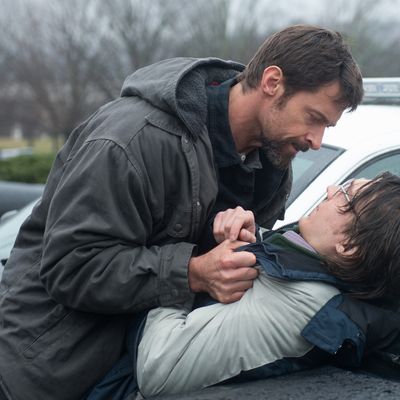
The killing of a small child in Quebecois director Denis Villeneuve’s 2010 wrenching drama Incendies was so nightmarish that I almost hesitated to recommend the film, yet in context the atrocity made terrible sense. It was true to a tribal culture perverted by what one character called “the merciless logic of reprisals”—so true that I was sure that in his new, Hollywood kidnapping drama, Prisoners, Villeneuve wouldn’t exploit the peril to children for easy shocks. But my faith has been shaken.
Prisoners, written by Aaron Guzikowski, doesn’t come on like just another cheap kidnapping melodrama. It begins with the recitation of the Lord’s Prayer and is studded with dangling crosses and Catholic iconography and the promise of resurrection. It’s steeped in the higher gloom—the rain raineth every day—and the longing for a sign from above. Any sign. Christian hunter Keller Dover (Hugh Jackman) discovers his 6-year-old daughter and her friend missing after Thanksgiving dinner. We don’t know who took them or if they’ve even been taken. But there was an RV parked on the block driven by one Alex Jones (Paul Dano), who has what’s described as a 10-year-old’s intellect. There’s no physical evidence—not enough for Detective Loki (Jake Gyllenhaal) to keep Alex locked up. But in a fracas following Alex’s release, he appears to whisper something to Dover that indicates he has seen the girls. So the hunter takes matters into his own righteous hands.
This is the meat of Prisoners—and I can’t predict how anyone else will react to the scenes in which Dover imprisons and beats and tortures the mulishly withholding simpleton. But I found them shockingly undisturbing. It’s clear Alex knows more than he’s saying, and if it takes pounding his face in to find out what that is, so be it. Dover sits on the floor and moans at the violence he has been forced to inflict, while the father of the other girl (Terrence Howard) is stricken. Why? This is the old ticking-time-bomb scenario that’s always invoked by advocates of “extreme interrogation”—and if you succeed in selling that (usually bogus) scenario, there’s not much of a moral dilemma, at least in the context of a movie. Villeneuve is trying like hell to elevate what turns out to be a dumb genre picture.
Does the movie work? Sure. The material is sure-fire, and Villeneuve puts a knot in your stomach that never loosens. These aren’t thriller rhythms—they’re dirge-like, and they wash over you like that damn rain. Villeneuve gives the actors a lot of room. Viola Davis has a crazily nuanced scene when she regards the imprisoned man for the first time, and that chameleon Melissa Leo provides a few frissons in creepy-neutral mode as Alex’s aunt—only a live-wire actress can create a façade so dead. Jackman’s performance isn’t especially imaginative, but it’s hard not to be moved by his grief. He hasn’t just lost a child. He has lost the certainty that ruled his life—that with pure faith and will he could protect his family from harm.
On the other hand, I can’t tell what’s eating Gyllenhaal’s Loki. The actor’s dark eyes look as if they’ve been rimmed with black—he’s God’s Loneliest Man. The detective moves in slow motion, but you don’t know if it’s because the pacing and structure are faulty or if it’s the filmmaker’s way of making you think, In the real world, there is no instant gratification. But in the real world there wouldn’t be a red herring as dumb as the one in Prisoners. His higher gloom is full of low pulpy blows.
This review was initially published in the September 23, 2013, issue of New York magazine.





